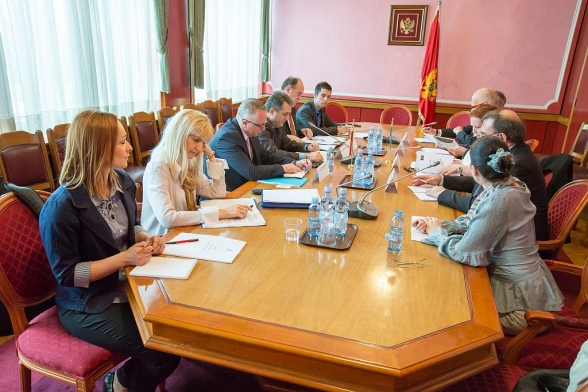Chairperson of the Security and Defence Committee Mr Mevludin Nuhodžić and members Mr Suljo Mustafić and Mr Vasilije Lalošević met today with the NATO expert team representatives, consisting of: Ms Patricia Shearing, NATO expert, former Advisor to the Ministry of Defence of Great Britain, Advisor to Latvia, Georgia and Sierra Leone, Mr Svein Eriksen Senior Adviser, Norwegian Agency for Public Management and e-Government, NATO expert, Mr Francisco Cardona, NATO expert, former Senior Advisor, SIGMA / OECD, Mr Olivier F. Desarzens, team leader, Head of the NATO BI Programme for South Eastern Europe, Federal Ministry of Foreign Affairs, Switzerland.
The Meeting was organised as a part of the project “Building Integrity in the Defence and Security Sector”, at the initiative of the NATO expert team, forwarded by the Ministry of Defence. The Project “Building integrity in the defence and security sector” was initiated by the Norwegian Ministry of Defence at the end of last year and it was adjusted for the South East Europe countries, including: Bulgaria, Romania, Serbia, Macedonia, Montenegro, Bosnia and Herzegovina, Croatia and Albania. The basic goal of the project is help for the non-NATO members in the preparation process for Alliance membership, support in recognising and implementing measures in fight against corruption, as well as awareness rising on Building integrity. The project will be implemented in two phases, the first phase relating to the needs analyses, i.e. perceiving of the current situation for the purpose of recognising risk factors which could contribute to corruption, while in the second phase, on the basis of analyses results, possible projects and reforms will be defined. The needs analyses should be implemented through cooperation of the Norwegian Government with ministries of defence and other institutions, in the way that local experts would perform interviews in each of the concerned countries with representatives of institutions covered by the analyses, on the basis of which it will prepare respective reports. The needs analyses together with answers to Questionnaire on integrity building will serve as basis to NATO expert team for drafting a report on state of affairs in Montenegro (Peer review). The questions from the Questionnaire are related to the national system for preventing corruption in the field of defence and security, starting from civic and democratic control referring to control role of the Parliament of the Council for Defence and Security, as well as participation of the civic sector (NGO sector), issue of legislation in the anticorruption field (adopted national and international documents), issue of policy for fight against corruption in the defence and security, personnel policy, transparency of financial reports, public procurement, tender procedure, participation in missions, treatment of state assets, processing of corruption cases before a competent court, etc.
At the meeting, the Committee members had an opportunity to state their opinions, recommendations and ideas useful for drafting the final report of this project evaluator.
The Committee Chairperson emphasised the significance of two-year implementation of the Law on Parliamentary Oversight in the Fields of Security and Defence, what significantly expanded and strengthened competences and responsibilities of the Committee, with a special emphasis to implementation of the oversight role of the Parliament. He pointed out to consistent realisation of the consideration of the annual performance reports of the Ministry of Defence and Army of Montenegro, National Security Agency, Ministry of Interior, as well as special information on all current issues in the field of security and defence, perceiving them through control and consultative hearing, as well as the content of the Plan adopted unanimously.
At the end of the Meeting, it was emphasised that the aim of the Committee work is to sustain continuity and professionally raise quality of the Parliament participation in reform processes of the defence and security sector, especially regarding the democratic oversight of it, in order to achieve necessary standards and become the NATO and EU member as soon as possible.









